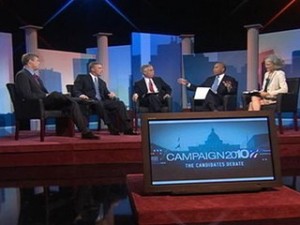 Old friend Mark Leccese has an interesting blog post at Boston.com about the first televised gubernatorial debate, hosted Tuesday evening by another old friend, WBZ-TV (Channel 4) political analyst Jon Keller.
Old friend Mark Leccese has an interesting blog post at Boston.com about the first televised gubernatorial debate, hosted Tuesday evening by another old friend, WBZ-TV (Channel 4) political analyst Jon Keller.
Leccese — God bless him — took in all of the local television coverage to determine how much attention the debate got. And he concludes that the debate was all but ignored, with the exception of NECN and, of course, WBZ.
The city’s two dailies, Leccese adds, gave it plenty of coverage.
Leccese wonders whether the lack of coverage was due to television executives’ wanting “to play down the story of the debate because it was on a rival station” — or if, instead, “local TV newscasts don’t find debates among the four people from whom the voters will choose the most powerful person in state government particularly newsworthy.”
My suspicion is that it’s a little bit of both.
If you missed the debate, you can still watch it online here. It’s also being broadcast in Spanish.
I caught about two-thirds of it in my car, and then watched the last 20 minutes. With the exception of a weird question about President Obama’s aunt, dropped in toward the end, I thought Keller turned in his usual fine job. He got out of the way and let Democratic Gov. Deval Patrick and Republican challenger Charlie Baker really mix it up, while still giving Green-Rainbow Party candidate Jill Stein and independent Tim Cahill a chance to make their case.
The debate was a ratings hit, too, writes the Herald’s Jessica Heslam — it came in third during the 7 p.m. time slot, not far behind the Red Sox and “Chronicle.”
Who won? I thought Patrick came off as by far the most personable of the four, and Baker scored some points on substance. As Michael Levenson reported in the Globe on Thursday, Patrick was wrong in claiming that Harvard Pilgrim Health Care was bailed out with “state aid” when Baker was its chief executive, an overreach that could come back to haunt the governor.
Perhaps the key was that Cahill, the state treasurer, proved to be a more effective debater than the substantive but sound-bite-challenged Stein. Since the conventional wisdom is that Cahill takes away votes from Baker and Stein from Patrick, perhaps Patrick (who really overdid it in sucking up to Cahill) was the winner by default.
Photo from wbztv.com.

 The challenge for non-profit news sites is that national and local foundations may be willing to help them get off the ground, but at some point they want them to be self-sustaining. Will readers of a site like the
The challenge for non-profit news sites is that national and local foundations may be willing to help them get off the ground, but at some point they want them to be self-sustaining. Will readers of a site like the 